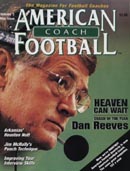Article CategoriesAFM Magazine
|
Q&A with Dan Reeves© More from this issueQ: Would you say that your experiences as a successful player in college (South Carolina) and the NFL (Dallas) have helped you as a coach? A: I think it has helped me a great deal. I first got involved in coaching as a player-coach for the Cowboys. Coaching was not something I had thought about. I was not one of those people that always knew I wanted to become a coach after my playing days were over. It wasn't until I hurt my knee and Coach Landry asked me if I would be interested in being a player/coach that the thought ever entered my mind. As I look back now, I wish that I had some of the experiences as a high school and college coach from a teaching standpoint. But, I was fortunate in that I was exposed to some great teachers during my career. Also, having been a player, I can relate to the problems of the pla....The full article can only be seen by subscribers.
|
|
|||||||
| HOME |
MAGAZINE |
SUBSCRIBE | ONLINE COLUMNISTS | COACHING VIDEOS |
Copyright 2025, AmericanFootballMonthly.com
All Rights Reserved





